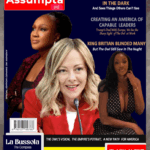ASSUMPTA WEEKLY MAGAZINE PRESENTS:





https://www.instagram.com/hairsenta?igsh=MXAzOThhNGZ0Nm15dQ==
✨Experience Luxury with the Best Human Hair Extensions from Ghana – Hair Senta!✨
Looking for premium, 100% human hair extensions that blend seamlessly, last long, and elevate your style? Hair Senta has got you covered!
✅ Top-quality, tangle-free human hair
✅ Variety of textures & lengths
✅ Perfect for wigs, weaves & custom styles
✅ Trusted by top stylists & beauty enthusiasts
📍 Visit us: 24 Jungle Avenue, Accra, Ghana
📞 Call: (+233) 0544354455 / 0248629769
🌐 Shop now: www.hairsenta.com
Join the Hair Senta family! Follow @gwen_addo, @directionbygwen, and 70+ others for the latest hair trends! 💕
#HairSenta #LuxuryHair #HumanHairExtensions #GhanaBeauty #SlayEffortlessly

“THE REQUIREMENTS” NEWSLETTER
GHANA’S EXODUS: THE CRITICAL NEED FOR ACTION
With Akua Boadiwaa Boateng;
Article Title: The Shrinking Workforce
Content: Urgent Steps for Ghana’s Future!
- Facing the Crisis
- Why Ghana Needs a Plan
- The High Cost of Government Failure
Assumpta Stream: A Path Forward
✅ Encourage Investment & Industrialization
✅ Improve Salaries & Working Conditions
✅ Strengthen Governance
“REQUIREMENTS” – A CONVERSATION YOU CAN’T AFFORD TO MISS!
On Friday, March 28, 2025, something BIG is dropping. Ghana’s most pressing issues—mass migration, corruption, food insecurity, and economic collapse—take center stage in the latest edition of Requirements.
And this time, it’s not just an article—it’s a heated, no-holds-barred dialogue between two powerhouse voices:
Miss The bold, unfiltered voice of reason.

Cookieteegh – The sharp mind with the tough questions.

What’s happening in Ghana?
- Why is Ghana losing 200,000 workers every year?
- How did corruption and government mismanagement lead to food shortages and skyrocketing prices?
- Why are scandals draining national resources while citizens struggle?
- Is there hope, or are we witnessing a slow collapse?
COMING SOON: “REQUIREMENTS” – A CONVERSATION GHANA CAN’T IGNORE
For 67 years, Ghana’s governments have failed to secure a stable economy, food security, and fair wages. Instead, leaders benefit from corrupt schemes, while everyday Ghanaians struggle, starve, or flee.
From fake food security programs to vanishing state funds, corruption is costing lives. Ghana does not have a national unemployment system, and the few social programs in place are being exploited by politicians instead of the people who need them most.
No food. No opportunities. No accountability.
On March 28th, the truth came out. Are you ready to face it?
#Requirements #GhanaAtRisk #FoodCrisis #TheDialogueBegins
WHAT ARE LABOR INSTITUTIONS & WHY DO THEY MATTER?
A labor institution in a country refers to the organizations, laws, and policies that regulate and govern the labor market, employment relationships, and workers’ rights. These institutions ensure fair working conditions, protect workers from exploitation, and create a stable labor market.
Key Components of Labor Institutions
- Government Agencies – Ministries of labor, employment commissions, and labor courts that enforce labor laws.
- Labor Laws & Regulations – Laws on wages, working hours, benefits, workplace safety, and dispute resolution.
- Trade Unions & Worker Organizations – Groups that advocate for workers’ rights, negotiate wages, and push for better working conditions.
- Employer Organizations – Business groups that represent employers in labor negotiations and policy discussions.
- Social Security & Unemployment Programs – Systems that provide financial support to unemployed workers, retirees, and those unable to work.
- Collective Bargaining Systems – Agreements between employers and workers to set wages, benefits, and labor conditions.
Why Are Labor Institutions Important?
- They protect workers’ rights and prevent exploitation.
- They regulate employment relationships, ensuring fair treatment.
- They stabilize the economy by managing unemployment and job security.
- They mediate labor disputes, preventing strikes and disruptions.
THE FAILURE OF GHANA’S LABOR INSTITUTIONS
Looking at the definition and functions of labor institutions, we can say that there has never been an explicit definition of “essential services” in the mindset of Ghana’s political leaders.
Services such as water, sanitation, and public transport, which are widely regarded as essential by the general population, have not been clearly defined or prioritized by Ghana’s political actors—leaders we see every day, dressed in suits and ties, yet failing to address these fundamental needs.
Furthermore, there is no clear definition of labor institutions for low-income earners in Ghana. There is also no structured policy ensuring equal access to necessities like housing, water, sanitation, energy, public transport, digital infrastructure, and financial services.
Key Questions Ghana Must Answer:
- Does Ghana have municipal housing for its citizens and a reliable water supply system?
- Are there any mechanisms or policies in place to find alternative solutions for low-income households?
- Has the government introduced any reforms or budget allocations aimed at providing social justice and essential services to its people?
If these questions remain unanswered, then Ghana’s labor institutions—and its leadership—must be held accountable.
FINAL THOUGHTS: CAN GHANA REFORM BEFORE IT’S TOO LATE?
Ghana stands at a critical crossroads. The workforce is shrinking, corruption is thriving, and social systems are failing. Without urgent action, the nation risks economic stagnation, increased crime, and continued mass migration.
The solution is clear: invest in local industries, create fair employment policies, protect workers’ rights, and ensure access to essential services.
The time for empty promises is over. Ghana needs action.
On March 28th, the truth will be exposed. Will the government listen?
#Requirements #GhanaAtRisk #TimeForChange
“REQUIREMENTS” NEWSLETTER
GHANA’S EXODUS: THE CRITICAL NEED FOR ACTION
A Dialogue Between Cookieteegh & Akua Boadiwaa Boateng
Prologue

Cookieteegh:
Welcome, Cookieteegh. It’s always a pleasure to have these conversations with you. But today, we are not here to exchange pleasantries. We are here because Ghana is bleeding—its people are leaving, its workforce is shrinking, and its leaders are failing.

Akua:
Thank you, Cookieteegh. You’re right. This isn’t just another discussion. This is an emergency. Ghana is losing 200,000 people every year to migration. Why? Because the government has no plan. The system is broken, and those in power—both the old and new political parties—have turned leadership into a game of lies, theft, and personal gain.

Cookieteegh:
Let’s be clear: This is not just about economics. This is about survival. We are talking about a nation that has abandoned its workers, allowed food prices to soar, and failed to create any form of social security or unemployment safety net. Corruption is costing lives, and yet, our leaders are dining and dancing in suits and ties.
Article Title: The Shrinking Workforce
Content: Urgent Steps for Ghana’s Future!
(1) Facing the Crisis

Cookieteegh:
Akua, let’s start with the elephant in the room. Why is Ghana’s workforce collapsing?

Akua:
Ghana is not a country that creates opportunities—it exports its people instead. When was the last time we heard a government policy aimed at job creation? Instead, they encourage nurses, teachers, engineers, and skilled workers to leave rather than fix the broken system.

Cookieteegh:
And while they encourage migration, they dare to pretend they care. They stand at podiums, promising jobs and development, yet every year, more businesses shut down, salaries stagnate, and unemployment soars.

Akua:
Let’s not forget corruption. The money meant for industrialization and employment programs mysteriously disappears. Meanwhile, Ghanaians can barely afford food. We now live in a country where one bag of rice costs more than the average worker’s monthly salary.
(2) Why Ghana Needs a Plan

Cookieteegh:
So what’s the solution? How does Ghana rebuild?

Akua:
Step one: A government that serves the people. We need leaders who prioritize investment, industrialization, and job creation—not their pockets. Instead of stealing from state funds, why don’t they build factories, support agriculture, and create jobs?

Cookieteegh:
And let’s talk about wages. Ghanaian workers work hard but earn nothing. How do you expect people to stay when they can barely afford rent, transportation, or healthcare?

Akua:
Well, we need a national unemployment system—one that protects workers when they lose their jobs. No Ghanaian should be forced into crime or poverty because of a failed economy.

(3) The High Cost of Government Failure
Cookieteegh:
67 years since independence, and what do we have? Politicians who speak big English, make empty promises, and leave ordinary Ghanaians to suffer.

Akua:
Let’s call it what it is: A leadership of lies and thieves. These politicians are no different from the ones who betrayed Kwame Nkrumah. They let him bleed, and now they’re letting the nation bleed. And the worst part? They don’t care. Whether NDC, NPP, or any other party, they all take turns robbing Ghana.
Assumpta Stream: A Path Forward
✅ Encourage Investment & Industrialization
✅ Improve Salaries & Working Conditions
✅ Strengthen Governance

Cookieteegh:
So what must change? How does Ghana move forward?

Akua:
First, we need leaders who fear and respect the people, not vice versa. We must demand:
- Serious investments in local industries to create jobs.
- Higher wages that allow Ghanaians to live, not just survive.
- Accountability—any leader who steals state money must face justice.
- And most importantly, Ghana must remember: No politician will save us. We must save ourselves.
Final Thoughts: Will Ghana Reform Before It’s Too Late?

Cookieteegh:
Akua, one last question: Is there hope?

Akua :
Hope? Only if we fight for it. Because if we leave things as they are, Ghana will continue to bleed, starve, and collapse.

Cookieteegh: Let’s take McDonald’s in Ghana as an example. It is everywhere, expanding into townships and employing Ghanaians. However, the business itself is owned by a single foreigner, not a Ghanaian citizen.
While McDonald’s provides jobs, giving Ghanaians a sense of security and dignity, true economic independence comes from ownership. If 80% of businesses in Ghana were owned by Ghanaians, the economy would be more diverse and self-sustaining, rather than being dominated by a few foreign companies.
By allowing foreign businesses to control a significant portion of the economy, Ghana risks missing out on industrialization. If most businesses were Ghanaian-owned and products were produced locally, there would be less reliance on foreign brands, including unhealthy imports like Red Bull or Monster. A stronger local economy would promote self-sufficiency, healthier alternatives, and long-term national growth.

Akua: Thank you Cookieteegh. You have raised a strong argument about economic independence, industrialization, and local ownership in Ghana. Here’s a breakdown of the key points in your argument:
- Employment vs. Ownership
- McDonald’s (and other foreign companies) provide jobs for Ghanaians, which gives workers financial stability and dignity.
- However, the profits largely go to foreign owners, limiting Ghana’s long-term economic benefits.
- Economic Dependence on Foreign Businesses
- If 80% of businesses in Ghana were owned by Ghanaians, the economy would be stronger and more diversified.
- More local ownership means wealth stays within the country, benefiting communities rather than a few multinational corporations.
- Industrialization & Local Production
- A Ghanaian-owned economy would focus on local industries, reducing dependence on foreign brands.
- There would be no need for unhealthy foreign products like Red Bull or Monster if Ghana produced its own healthier alternatives.
What Ghana Loses by Not Controlling Its Economy
- Loss of wealth: Profits from foreign businesses leave Ghana instead of being reinvested locally.
- Limited industrialization: Over-reliance on imports discourages local production.
- Cultural & health impacts: Foreign products shape consumption habits, often leading to unhealthy lifestyles.
A Possible Solution?
Ghana could focus on policies that:
- Encourage local entrepreneurship and investments.
- Support local food & beverage industries to replace unhealthy imports.
- Implement business regulations that favor Ghanaian ownership in key industries.

Cookieteegh : What do you think should be done to push for more Ghanaian-owned businesses?
Then, in next episode, the truth must be told. No more lies. No more silence.
COMING SOON: “REQUIREMENTS” – A CONVERSATION GHANA CAN’T IGNORE
#Requirements #GhanaAtRisk #TimeForChange
SGI: Our Shared Humanity .

https://www.instagram.com/valerieagyeman?igsh=dHh1NTE0YnNqODY0
“Meet Valerie Agyeman – the powerhouse transforming women’s health & beauty!
Featured in Vogue, Essence, and Good Housekeeping, Valerie is redefining wellness with expert insights, real talk, and game-changing advice. From NYC to the world, she’s your go-to for radiant health, glowing confidence, and unstoppable energy.
Are you ready to unlock the best version of YOU? Stay tuned. Something big is coming… ✨
#ValerieAgyeman #WomensHealth #BeautyFromWithin #NYC #HealthRevolution”

https://www.instagram.com/delish_bakerygh?igsh=MW5ic2c0NnR5cHBwZQ==
“Something Fresh is Rising at Delish Bread Grocery Store… 🍞✨
Craving the perfect loaf? We’ve got over 12 irresistible varieties—Cob, Digestive, Butter, Whole Wheat, Fruit, Sweet Bread, plus Cakes & Pastries that melt in your mouth!
Freshly baked, incredibly delicious, and made just for YOU. But hurry… the best ones go fast!
📍 Location: Agboba
📞 Call/WhatsApp: 0201789403
Your next bite of perfection is just a visit away! 🍞🔥 #DelishBread #FreshlyBaked #TasteTheDifference”







https://www.instagram.com/serwaaamihere?igsh=N216N3hzeTE3eHho
“Serwaa Amihere – More Than a Broadcaster, A Lifestyle Visionary! 🌟”
From the newsroom to shaping Ghana’s lifestyle, Serwaa Amihere is redefining what it means to live well! As a broadcaster, entrepreneur, and advocate, she’s now ensuring Ghanaians have quality food, rich spices, and eco-friendly fashion that make life healthier and more stylish.
💇♀️ Founder: @oh_my_hairr
🏢 Entrepreneur: @officeandcobysa
💙 Philanthropist: @serwaaamiherefoundation
🌍 Explore More: www.officeandcobysa.com.gh
Stay tuned—something exciting is always on the way! ✨

https://www.instagram.com/goba_kente?igsh=d2Vwd2E2M2VtcTZq
“GOBA KENTE – Where Tradition Meets Timeless Elegance! 🕊️✨”
Step into the Home of Dignity, Tradition, and Cultural Heritage, where every weave tells a story. GOBA KENTE is more than fabric—it’s a masterpiece of colors, creativity, and craftsmanship, woven with pride.
🌍 Worldwide Shipping Available – Authentic Kente, delivered to your doorstep!
📍 Find us on Google Maps – Experience the legacy in person.
🔗 Shop Now: Qlinktr.ee/gobakente
📸 Follow us: @goba_kente
GOBA TOGETHER – Wear Your Culture with Pride! 🖤💛💚

https://www.instagram.com/laurenhautecouture?igsh=MWxzNXN1Ym5nZ3o3Mg==
“Nana Ama McBrown x Lauren Haute Couture – Elegance, Redefined! ✨👗”
Step into luxury, style, and sophistication with Nana Ama McBrown, the face of Lauren Haute Couture. From timeless elegance to modern chic, every piece is crafted to make a statement.
📍 Visit Us: 5 Mama Adjeley Rd, East Airport, Ghana
📸 Explore More: @laurenhautecouture
Where fashion meets perfection. Dare to wear the extraordinary! 💫

https://www.instagram.com/ankara.africa?igsh=ZDJmN216Z2ZhbWFm
“📢 Grow Your Business with Ankara Africa! 🌍✨”
Looking to reach a bigger audience? Ankara Africa is the perfect platform to showcase your brand! Whether it’s fashion, beauty, culture, or lifestyle, we connect you with the right customers.
🚀 Advertise with us & watch your business thrive!
🔗 Start now: naijasocialmedia.com
Your brand deserves the spotlight—let’s make it happen! 💼🔥 #AnkaraAfrica #AdvertiseWithUs #BusinessGrowth










